TAT Forum
August 2022
Receive new-Forum notifications each month
Not getting your notifications?

Let your voice be heard
Enjoy the benefits of TAT membership
Become a TAT member
Help support TAT;
become a member today

|
As an Amazon Associate, TAT earns from qualifying purchases made through links on our website. |

Convictions & Concerns
TAT members share their personal convictions and/or concerns
Intuition & Honesty

Everyone treads the path to Truth based on feelings, even those who see themselves or are seen as the analytical and intellectual type. After all, feeling precedes thinking. It influences, even generates, thoughts. Thinking is largely—maybe even completely—reactionary, and feelings along with physical sensations are primary sources of our mental reactions. Emotions likewise are largely—maybe even completely—reactionary, being preceded or triggered by physical factors, both arising in the physical body and from the continuous onslaught of experience.
Left-brained seekers typically react without acknowledging their feelings, devising rational explanations for their reactions and getting caught-up in conceptual thinking. Right-brained seekers largely bypass such analytical spinning and go directly into the whirlpool of emotions.
Both approaches to finding the Truth, to finding the Real, are lacking. They might never bring you to clear, objective seeing of yourself, the way you live your life, and the world in which you live. Chief among the reasons why is lack of self-honesty. Another reason is your need to protect yourself, psychologically. Another reason is a lack of consciousness of desires and the degree to which you are driven by them....
 See the complete article.
See the complete article.

~ Thanks to Bob Cergol for this essay based on a presentation he made at the September 2009 TAT meeting. Photo from pixabay.com. Comments or questions? Please email Reader Commentary to the .


TAT Foundation News
It's all about "ladder work" – helping and being helped
Richard Rose, the founder of the TAT Foundation, spent his life searching for the Truth, finding it, and helping others to find their Way. Although not well known to the public, he touched the lives of thousands of spiritual seekers through his books and lectures and through personal contacts with local study groups that continue to work with his teachings today. He felt strongly that helping others generates help for ourselves as well in our climb up the ladder to the golden find beyond the mind.
Call To Action For TAT Forum Readers
You can help! A volunteer is producing shareable text-quote and video content of Richard Rose and TAT-adjacent teachers. We need your suggestions for short, provocative 1-3 sentence quotes or 1 minute or less video clips of people like Rose, Art Ticknor, Bob Fergeson, Tess Hughes, Bob Cergol, Bart Marshall, Shawn Nevins, Anima Pundeer, Norio Kushi, Paul Rezendes, Paul Constant, & other favorites. (An example here is selected by the TAT member who volunteers to oversee the Instagram account.) Please send favorite inspiring/irritating quotes—from books you have by those authors, from the TAT Forum, or any other place—to . If you have favorite parts of longer videos (ex: from a talk at a past TAT meeting), please email a link to the video and a timestamp. Thank you!
|

Project: Beyond Mind, Beyond Death II
We've had 14 additional years of monthly TAT Forum issues since then. And we're getting ready to launch a project to solicit recommendations from all readers for a 2nd volume of BMBD from the seven years of monthly issues spanning January 2008 to December 2014. Our approach will be to have a brief, interactive survey each week for participants to rate the items in one issue of the Forum for inclusion in volume II. That will take about 20 months, during which time volunteer co-editors Abhay D. and Michael R. will arrange the selections into chapters and organize the book's contents. Within 2 years BMBD II should be available in paperback and e-book formats.
|

|
TAT Foundation Press's latest publication Passages: An Introduction and Commentary on Richard Rose’s Albigen System The latest book from the TAT Foundation Press, Passages: An Introduction and Commentary on Richard Rose’s Albigen System, is now available in print and Kindle versions on Amazon.com. Mike Gegenheimer and Shawn Nevins combined their experience with Rose's teachings to create this introduction to Rose's work. Passages highlights the tools and techniques for self-realization that Rose recommended. It is a concise yet deep plunge into these valuable spiritual teachings.
|

|
Random rotation of |

2022 TAT Meeting Calendar
February Virtual Gathering: Saturday, February 5, 2022
|

|
See TAT's Facebook page. |

TAT's YouTube ChannelHave you seen the TAT Foundation's YouTube channel? Subscribe now for spiritual inspiration (and irritation)! Volunteers have been updating the channel with hours of new content! They've also curated some great playlists of talks by Richard Rose, teacher talks from recent & not so recent TAT meetings, episodes of the Journals of Spiritual Discovery podcast, and other great TAT related videos from around the internet. Featuring: Richard Rose, Bob Cergol, Shawn Nevins, Bob Fergeson, Mike Conners, Anima Pundeer, Norio Kushi, Bart Marshall, Paul Rezendes, Tess Hughes, Art Ticknor, Howdie Mickoski, Shawn Pethel and other speakers. This month's video, "Richard Rose & the Threefold Path: A discussion with Shawn Nevins," is from the June 2021 TAT meeting.
|

Local Group News
Groups with new updates are featured below. Link here for a complete listing of local groups.
|
|
![]()
|
|

Members-Only Area
A password-protected section of the website is available for TAT members. (Note that there's an occasional glitch that, when you try to link to the members-only area or a sections within it, you'll get a page-not-found error. If you try the link a second time, it should work.) Contents include:
- How you can help TAT and fellow seekers,
- Audio recordings of selected sessions from 2008–2019 in-person meetings and from February and November 2021 Zoom meetings,
- Resources and ideas for those planning a group spiritual retreat,
- Photographs of TAT meeting facilities, the Richard Rose gravesite, a rare 1979 photo, and aerial photos of the Rose farm,
- Presenters' talk notes from April TAT meetings in 2005–2007, and
- TAT News Letters from 1996–2013 and Annual Retrospectives from 1973 thru 2011. The Retrospectives from 1973–1985 were written by Richard Rose and are replete with ideas on the workings of a spiritual group—rich historical content.
- TAT policies, TAT business meeting notes, and other information.
Latest recordings:
 TAT's Novemeber 2021 online gathering, titled What Do You Really, Really Want From Life?: 3.5 hours of selected sessions.
TAT's Novemeber 2021 online gathering, titled What Do You Really, Really Want From Life?: 3.5 hours of selected sessions.
 TAT's February 2021 online gathering, titled In Thought, Word and Deed : 2.5 hours of selected sessions.
TAT's February 2021 online gathering, titled In Thought, Word and Deed : 2.5 hours of selected sessions.
 TAT's August 2019 Workshop was titled Beyond Mindfulness: Meditation and the Path Within and included three guest speakers who each led separate workshops. The following audio recordings are now available in the members-only website area:
TAT's August 2019 Workshop was titled Beyond Mindfulness: Meditation and the Path Within and included three guest speakers who each led separate workshops. The following audio recordings are now available in the members-only website area:
- "Mindfulness. Is it just another spiritual buzzword?" with Bob Cergol,
- "The Path of Direct Sensory Perception" with Bob Harwood, and
- "The Art of Mindfulness is the Passion for Truth" with Paul Rezendes.
 TAT's June 2019 Spiritual Retreat Weekend was titled Between You and the Infinite. The following audio recordings are now available in the members-only website area:
TAT's June 2019 Spiritual Retreat Weekend was titled Between You and the Infinite. The following audio recordings are now available in the members-only website area:
- "Coming Home (aka The End of Seeking)" by Don Oakley, and
- "What's in the Way?" by Eshwar Segobind.
 TAT's April 2019 Spiritual Retreat Weekend was titled Once in a Lifetime is Now. The following audio recordings are now available in the members-only website area:
TAT's April 2019 Spiritual Retreat Weekend was titled Once in a Lifetime is Now. The following audio recordings are now available in the members-only website area:
- "Recognizing the Human Dilemma" by Norio Kushi,
- "Strategies for Self-Realization" by Bart Marshall,
- Untitled session by Paul Hedderman, and
- "A Session in the Now" by Paul Rezendes.
Please us if you have questions. (Look here for info on TAT membership.)

Amazon and eBay
|
As an Amazon Associate TAT earns from qualifying purchases made through links on our website. TAT has registered with the eBay Giving Works program. You can list an item there and select TAT to receive a portion of your sale. Or if you use the link and donate 100% of the proceeds to TAT, you won't pay any seller fees when an item sells and eBay will transfer all the funds to TAT for you. Check out our Giving Works page on eBay. Click on the "For sellers" link on the left side of that page for details. |

Your Contributions to TAT News
TAT founder Richard Rose believed that working with others accelerates our retreat from untruth. He also felt that such efforts were most effective when applied with discernment, meaning working with others on the rungs of the ladder closest to our own. The TAT News section is for TAT members to communicate about work they've been doing with or for other members and friends. Please your "ladder work" news.


Humor {(h)yo͞omər}
"One thing you must be able to do in the midst
of any experience is laugh. And experience
should show you that it isn't real, that it's a
movie. Life doesn't take you seriously, so why
take it seriously." ~ Richard Rose, Carillon
|
Gogo
|

|
* ~ Thanks to Colm H.
|
|
~ Thanks to Dan G.
|

 We enjoy presenting humor here from TAT members and friends. Please
your written or graphic creations. Exact sources are necessary for other submissions, since we need to make sure they're either in the public domain or that we have permission to use them.
We enjoy presenting humor here from TAT members and friends. Please
your written or graphic creations. Exact sources are necessary for other submissions, since we need to make sure they're either in the public domain or that we have permission to use them.

Inspiration & Irritation
Irritation moves us; inspiration provides a direction
|
“If you think about our educational system and how we grow up, we are trained more and more and more to get into thinking, and thinking is wonderful stuff; very powerful. Some of the greatest achievement of humanity come out of thought and out of imagination and out of creativity. “But the other piece of it that’s equally as powerful as the capacity for thought is the capacity for awareness, but we get no training in awareness and attention, a huge amount of training in thought so a lot of time when we get into bed at the end of the day we can’t deal with our thought.”
~ Thanks to Dan G. for the 5-minute video link and the selected quote. Adding a personal note, Dan wrote: "This is pretty much what I see when I attend to the mind’s activity." |

|
Once You Know What You Want
~ Thanks to BH, who spotted How To Train Your Brain To Get What You Want In 60 Days by Benjamin Hardy on thoughtcatalog.com and provided the selected quotes above. Photo from clipartmax.com.
|
|
~ Quote Investigator tells us: "Albert Einstein died in 1955. The earliest evidence known to QI linking Einstein to this expression appeared in the 1976 book The Metaphoric Mind: A Celebration of Creative Consciousness by Bob Samples." Here's a quote from the book: Albert Einstein called the intuitive or metaphoric mind a sacred gift. He added that the rational mind was a faithful servant. It is paradoxical that in the context of modern life we have begun to worship the servant and defile the divine. Photo by suju-foto on pixabay.com.
|

|
Douglas Harding on "Seeing"
Nacton, Sept 4 ‘99 Dear Shawn, Nice to hear from you. And thank you for the torus pictures, which seem to be a valid way of setting up our Cosmic/1st Person Singular Map. Thank you also for the help you generously gave us, in taming the wilderness we euphemistically call our garden. May I suggest that if you were to pursue our way of “seeing” because it pays off psychologically or spiritually, you will find many times when it seems to yield no benefits whatever; and is, in practical/experimental terms, a dead duck. But if, on the contrary, you go on “seeing” (in spite of no apparent benefits), because seeing reveals what’s the case, what’s so, the simple and always accessible truth about your nature at Centre – why then you practice “seeing” because, in the long, long run, it sets you free.* The more you go for the pay-off, the less you get, in the end! With all affectionate good wishes from Catherine & Douglas. *From all our anguished[?] delusions about who we really, really are.
|

Please
your thoughts on the above items.

Reader Commentary
Encouraging interactive readership among TAT members and friends
|
A reader wrote that what would make the Forum more interesting would be: Hearing from people who are searching—and have questions instead of those providing endless advice and "answers." What challenges they are facing. What their doubts and questions are. How they perceive their path is going. What they are doing in their lives. Where they think they will end up. Etc., etc. Can you help make the Forum more interesting? |
Sergio F. writes: "Recurring tunes that involuntarily pop up and stick in your mind are common: up to 98% of the Western population has experienced these earworms (cf: www.ncbi.nlm.nih.gov/pmc/articles/PMC4723199/). Usually, stuck songs are catchy tunes, popping up spontaneously or triggered by emotions, associations, or by hearing the melody."
The Reader Commentary's 3-pronged question for the August TAT Forum is:
Do you experience these 'earworms'? If so, do they follow some pattern? Do you have any theories about your experience of them?
Responses follow.

 From B&K:
From B&K:
I don't experience this too often these days, or not enough for it to stick out much in my memory. When I used to meditate a lot, sometimes this would happen after a long period of meditation, and it was sometimes distracting/frustrating at the time (if I recall correctly). But I don't remember noticing any patterns with the songs.
I do have a Mariah Carey song in my head right now, one K. (my girlfriend) has been singing some lately: 'you've got me feeling emotions' (ha).
She says, "I don't know about a pattern, but the tunes are always sentimental - they compliment the less sentimental parts of my thought."
 From Eric C:
From Eric C:
Earworms as annoying, unwanted intrusions as with the OCD patients cited in the study, has not been my experience. The repetition of melody by my brain is usually pleasurable. It feels as if there is a dopamine release from the initial hearing of the melody, and there is incentive for the brain to repeat the pleasurable experience.
In observing my brain repeating a melody to itself, it feels much like the thoughts produced by the default mode network – a chattering to itself. My understanding of the function of the latter is to maintain the appearance of self-in-time and self vs other. The brain’s musical repetitions are perhaps incorporated by the same network, yet seem to contribute less to the creation of the personal self. In observing the theater of the mind in order to answer this month’s question, it seems these snippets of sound are more pleasurable than the other (self-referential) thoughts.
If a task requiring focus arises, then the melody-playing loop subsidies for a time. Usually, it comes back; then is gradually repeated less often.
 From Patrick K:
From Patrick K:
Songs I like I don't consider earworms. It is the song that I find irritating that becomes the earworm for me. I have one earworm these days that has been with me almost 20 years now. I probably liked it initially in the “ignorance is bliss” state of my 20s. The song and band represent to me modern culture packaged in a nice inoffensive way. The lyrics when I think about them are woefully tacky to me. The reason I feel it became an earworm to me is because instinctually I want to jive along with everyone else as it is a very popular song, yet on an intuitive level I just in no way can dig it at all. It creates a kind of spasm reaction in me to look to the origin of the duality it is creating in me. My earworm I feel is prodding me to become my own authority, even if the whole world loves the song, if I don't like it, just admit that to myself, it is really ok.
 From Dan G:
From Dan G:
There is some science to creating an earworm per https://www.cbsnews.com/news/psychologists-identify-why-certain-songs-get-stuck-in-your-head/, and after reading the list of top 9 in that article, one of them is now stuck in my ear. Why that one? Answering that could involve multilayered analyzable meaning like a dream.
Humming the notes slowly, a couple of associations come up. Reading the lyrics out loud in a speaking voice, I have a few reactions. These associations and reactions potentially have nonverbal information about my mood and unquestioned identities.
I suspect the earworm also relates to Rose’s statement, "if you need entertainment or escape, you are asleep." If my mind is singing a song and I notice that, that seems like an opportunity to transmute the situation into watching the mind more deeply with awake presence.
 From Tim H:
From Tim H:
I do have earworms. Perhaps no more frequently than vivid dreams. They are non-intrusive. Though at times they seemingly pull me to listen to the song that's made a groove on my mind. The experience is usually pleasant and leads to some time listening to my favorite music. If there's any meaning to this, perhaps I'm being pulled to relax and enjoy some downtime.
 From Shawn Nevins:
From Shawn Nevins:
I would respond to the earworm request, but I have no clue what they mean! I used to think there must be a message and if I dig into the song I'll "get it." Despite innumerable attempts through reading lyrics, watching music videos, listening to the performance, I've never "gotten" what I was supposed to learn.
*
 Editor's comment:
TAT Foundation Press publishes Shawn's Passages: An Introduction and Commentary on Richard Rose’s Albigen System co-authored by Mike Gegenheimer,
Hydroglyphics: Reflections on the Sacred with photos by Phaedra Greenwood,
Subtraction: The Simple Math of Enlightenment, and
The Celibate Seeker.
He also authors the SpiritualTeachers.org website featuring recommendations of teachers, movies and books along with The Journals of Spiritual Discovery podcasts.
Editor's comment:
TAT Foundation Press publishes Shawn's Passages: An Introduction and Commentary on Richard Rose’s Albigen System co-authored by Mike Gegenheimer,
Hydroglyphics: Reflections on the Sacred with photos by Phaedra Greenwood,
Subtraction: The Simple Math of Enlightenment, and
The Celibate Seeker.
He also authors the SpiritualTeachers.org website featuring recommendations of teachers, movies and books along with The Journals of Spiritual Discovery podcasts.
 From Mark W:
From Mark W:
I can remember having music earworms in my head even as a child. Back then it took the form of TV add jingles which I can still sing word for word. On one hand, I find that amusing, but on the other hand, it’s annoying that such music, even TV jingles, can be so intrusive and persistent. A particularly interesting aspect is that I’m vulnerable to such musical distractions in my head even when I never liked the song at all. It seems to show just how sticky programming can be. That’s a scary thought when I think about it, and I wonder what other thoughts and beliefs I might unconsciously have that are as sticky and unwanted.
It seems that most of these earworms have a memory-related connection. Moreover, I’ve noticed lately that it’s as if some of these memories have an intrusive motivation behind their appearance. It feels like I’m somehow indebted to them, and I still owe them my attention or energy because of whatever meager role they had in the past as part of my identity. Now that’s what I call sticky – the mental mafia I can’t seem to shake off!
I do, however, now that I think about it, remember how important music was to me in high school and college. That was especially true when singing some of my favorite songs. I remember music as being the most convenient, effective and passionate way for me to express my feelings. I guess I do miss that, but the onset of allergy symptoms in 1986 closed that outlet rather abruptly.
Nevertheless, I do not miss the truly obsessive and intrusive way that music seemed to thrive in my head before 1986. That was, perhaps, the programmed payoff for the passion mentioned above. But these days, I’ll gladly renege on that deal. The everyday thoughts in my monkey mind and the occasional song in my head triggered by my Walmart radio shopping experience is enough for me to contend with for now.
I may have come full circle in the way in which music has shown up in the past nine months, however. For almost the last three years, I seem to have developed an affinity for nostalgia. I hit a dry spell a year ago when I felt as if I longed for the longing of nostalgia. I was saddened by this but didn’t see what I could do about it. Then, to my surprise, nostalgia returned as strong as ever, seemingly and separately triggered by music each time, and did not trigger any earworms like in the past. That was quite a relief on a path full of surprises, yet I have no idea where that leaves me now or what’s next other than to double down on my commitment to my search.
 From Art Ticknor:
From Art Ticknor:
I met Richard Rose and did my first solitary retreat when I was 33. The retreat was for a week on the RR farm in West Virginia, staying in an old trailer with no electricity or plumbing. I decided to fast (for the first time in my life) during the retreat since I didn't want to be bothered with food. And the trailer was parked near a spring, so I had plenty of water to drink.
Five surprises from the retreat come to mind. [I started the sentence with two then changed it to three, and so on.] One surprise was that I went the whole week without ever feeling hungry; that clued me into my misinterpretation of what I thought was the hunger signal but was mostly saying "entertain me" or "comfort me." A second surprise was seeing that my dreams could contain great humor: I was riding a bike with a fresh loaf of French bread in the basket, and I started to put the end of the loaf into my mouth then said to myself that I couldn't do that since I was fasting—and I awoke from the dream laughing.
A third surprise occurred when I was out walking on a dirt road that ran along a stream. This was after a couple of cold, rainy days. On my return to the farm, I spotted a boulder along the edge of the stream with the sun shining on it, and I thought it would be great to sit there to warm up. But then I saw a No Tresspassing sign and thought there might be a hillbilly hiding behind one of the trees with a gun. I found myself stopped in my tracks, watching the decision-making process roll out in great detail. There were different "characters" or "voices" each trying to get into the spotlight to get what they wanted. Those fears and desires had aligned into two teams, one wanting to go to the boulder and the other not wanting to ... and they were about evenly matched in their tug of war. Eventually the team that didn't want to go to the boulder won the argument. What determined the outcome? The team that made the most noise.
The fourth surprise was getting the nursery rhyme Mary Had a Little Lamb stuck in my head on and off over several of the days. I'd never had a song stuck in my head before ... and why this ridiculous one?! My thoughts were always rational! I even ignored feelings since they were irrational! :-) I didn't see the reason for why this material had gotten lodged in my thoughts, but it surely challenged the conviction that I had control over my thinking.
And the fifth surprise occurred near the end of the retreat, when a light bulb flashed on in my head. I thought that only happened in cartoons. What followed the illuminated bulb was the strong, worded conviction that my only chance for mental clarity was an extended period of celibacy. I didn't label it as such at the time, but in retrospect I see it as the result of my intuition processing the material in Rose's Energy Transmutation, Between-ness and Transmission, which I had read during the retreat.
 From Brett S:
From Brett S:
My most memorable instance of an “earworm” was a dream I had. In it, Anima P. from TAT said something like, “I knew you were gonna be okay when I left you at Times Square.” When I woke-up, I had Mariah Carey’s “Hero” in my head. Some of the lyrics are:
“You don't have to be afraid
Of what you are
There's an answer
If you reach into your soul
... You can find love
If you search within yourself”
I had to go to Times Square for work that morning. As I was passing through the Times Square station, I saw a woman singing “Hero.” I stopped to listen and then went on my way. I can’t tell you any of it meant anything, but it was cool. More generally, I find that the lyrics of the song I’m singing often correspond to my mood.
 From Mark C:
From Mark C:
I regularly experience "earworms," which I have always chalked up to my younger days as a musician. I started playing the piano in 1975 (when I was 10) and the guitar when I was 15. I was an active member in quite a few rock banks between ages 16 and 33 and had to quit everything in 1998 due to becoming a single parent in an unexpected fashion.
I feel like I generally didn't find the earworms to be that bad of a thing, at least until I was attempting to go to sleep, or attempting to meditate. I have had earworms so bad in the past that I couldn't go to sleep, but luckily this was quite rare. I have had mixed results with it in meditation though, and sometimes it definitely can be an interference. Focusing on my breath or a question can definitely help, but not always.
I have noticed that sometimes the earworm starts immediately upon waking, but I don't notice it at all while I am dreaming. I pray in the shower everyday, and this seems to interrupt it, but then it will sometimes come back afterwards. It seems to be less of an issue if I am busy, but this could just be what seems like more pressing thoughts pushing the earworms to the background.
I have been in a solitary retreat the past 4 days and have noticed it being more of an issue during this isolation than any isolation before, possibly because I listened to some music on the way to my destination. My experience has been that avoiding music for a period of days seems to help quiet things down, and I have noticed in group retreats (where music is very rarely played) that the earworms seem to disappear or become less noticeable around day 3 or 4.
I think the article sent along with the earworm question ["Stuck song syndrome: musical obsessions — when to look for OCD" from the British Journal of General Practice; see link above. - Editor.] may also have some merit because I am not formally diagnosed with OCD, but I have definitely demonstrated compulsive behavior in my past.
 From Anima Pundeer:
From Anima Pundeer:
My theory about earworms is that they originate from a mood. Most of the time, it is early in the morning that i find a song stuck in my head. So maybe it is the mood of the dream that spills over during the day.
Brain, I find, is a thought churning machine. Most of the time these thoughts do not get our attention. But once in a while when there is a thought, an earworm, that is not part of my familiar, routine thoughts, it grabs my attention.
I have also found instances when a song gets stuck in my head which is describing something i may be going through. And then of course there is this catchy but annoying tune that gets stuck in my head and refuses to stop in spite of me trying.
*
 TAT Press publishes Anima's and Art's book Always Right Behind You: Parables & Poems of Love & Completion.
TAT Press publishes Anima's and Art's book Always Right Behind You: Parables & Poems of Love & Completion.

|
Next Month
Thanks to Michael R. for the Reader Commentary question for the September TAT Forum: Where are you? Where do you feel yourself to be? Are you inside the body or is the body inside you? Are you inside the mind or is the mind inside you? Please your responses by the 25th of August and indicate your preferred identification (the default is your first name and the initial letter of your last name).
|
 Other Reader Feedback
Other Reader Feedback
 From Shawn Nevins, whose response to the July Reader Commentary question ("Have you considered doing all things for the sake of a higher power, and if so, what does that mean, and how would you go about that?") was hiding in the editor's spam folder:
From Shawn Nevins, whose response to the July Reader Commentary question ("Have you considered doing all things for the sake of a higher power, and if so, what does that mean, and how would you go about that?") was hiding in the editor's spam folder:
I've thought of this scores of times over the years, generally when a critical mass of failures was reached—meaning the failure of circumstances to match my wishes. "I must be doing something wrong. If I could align myself with God's will everything would work out." Then I would try to detect any guidance being offered as I was presented with decision points. Should I turn left or right? Should I choose this book or that one? Do I detect any spark of inspiration or direction with a source other than my own desire? I wasn't "thinking" about what God's will is, rather I was looking/listening/feeling for the experience of God's will.
Of course, the mental mechanism of desperation leading me to that point of curiosity was akin to the old saying, "there are no atheists in foxholes."
I believe the notion of aligning with God's will is equivalent to "doing all things for the sake of a higher power." I prefer that wording as it avoids the absurdity of a higher power needing our help or consideration. But ultimately, even my preferred wording lands us in another absurdity—that we could ever be out of alignment with God's will; that a decision we make could ever be averse to anything except for a human-centric conception of a God, that there could be a God over there and a me here, or a "there" of any sort opposed to "here."
Here, at the heart of every moment, is where you need to "look for yourself" and see.

Q:
What are your thoughts on this month's reader commentary? Please
your feedback.

 Richard Rose described a spiritual path as living one's life
aimed at finding the meaning of that life.
Did you find anything relevant to your life or search in this month's TAT Forum?
Richard Rose described a spiritual path as living one's life
aimed at finding the meaning of that life.
Did you find anything relevant to your life or search in this month's TAT Forum?

We like hearing from you! Please
your comments, suggestions, inquiries, and submissions.
 Sign up for notices of TAT's four annual events and free
monthly Forums by email on our .
Sign up for notices of TAT's four annual events and free
monthly Forums by email on our .

Founder's Wisdom
Richard Rose (1917-2005) established the TAT Foundation
in 1973 to encourage people to work together on what
he considered to be the "grand project" of spiritual work.
|
* Direct Mind Approach to the Absolute *
* ~ Thanks to Shawn Nevins, who commented: "Notes I took from several Rose audiotapes. This must date to 1994-95. Direct quotes are in quotation marks, but the rest I assume is paraphrasing." There are quotes and notes from 20 audiotapes. The previous set appeared in the July Forum.
|

|
Definition of Terms
Index of many of the key terms and principles in Rose's work, with brief definitions, from Richard Rose's Psychology of the Observer: The Path to Reality Through the Self by John Kent. |

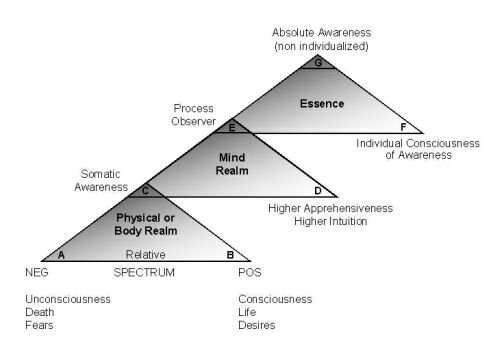
Jacob's Ladder © 2001 Richard Rose. See this transcript of a talk on the topic by Rose.

Homing Ground Update… A spot on earth where people can do retreats and hold
|
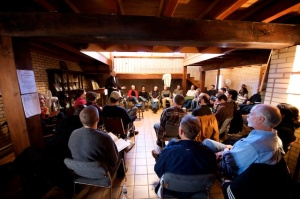
Did you enjoy the Forum? Then buy the book!
Readers' favorite selections from seven years of issues.
Beyond Mind, Beyond Death is available at Amazon.com.




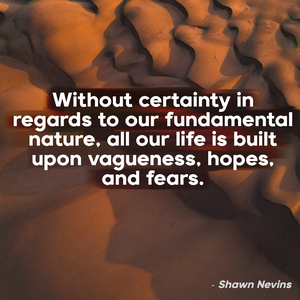 With the intention of increasing awareness of TAT's meetings, books, and Forum among younger serious seekers, the TAT Foundation is now on
With the intention of increasing awareness of TAT's meetings, books, and Forum among younger serious seekers, the TAT Foundation is now on  TAT Press's
TAT Press's 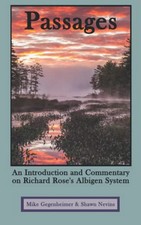



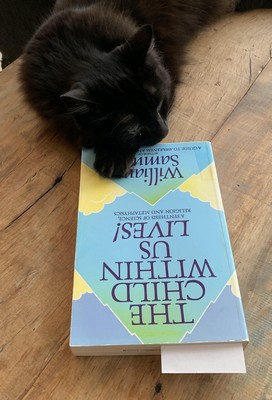
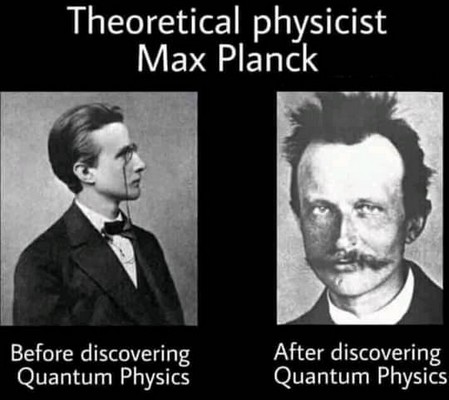

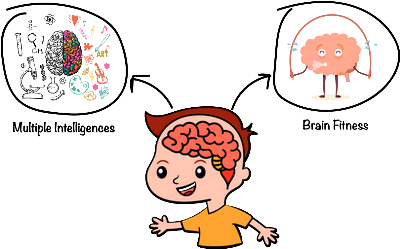

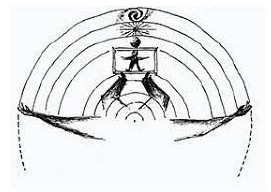
 Youniverse: A three-dimensional model that Harding designed in the 1970s to "illustrate the many layers of one's being, both as viewed by others from the outside, and viewed by oneself from the inside." See
Youniverse: A three-dimensional model that Harding designed in the 1970s to "illustrate the many layers of one's being, both as viewed by others from the outside, and viewed by oneself from the inside." See 





